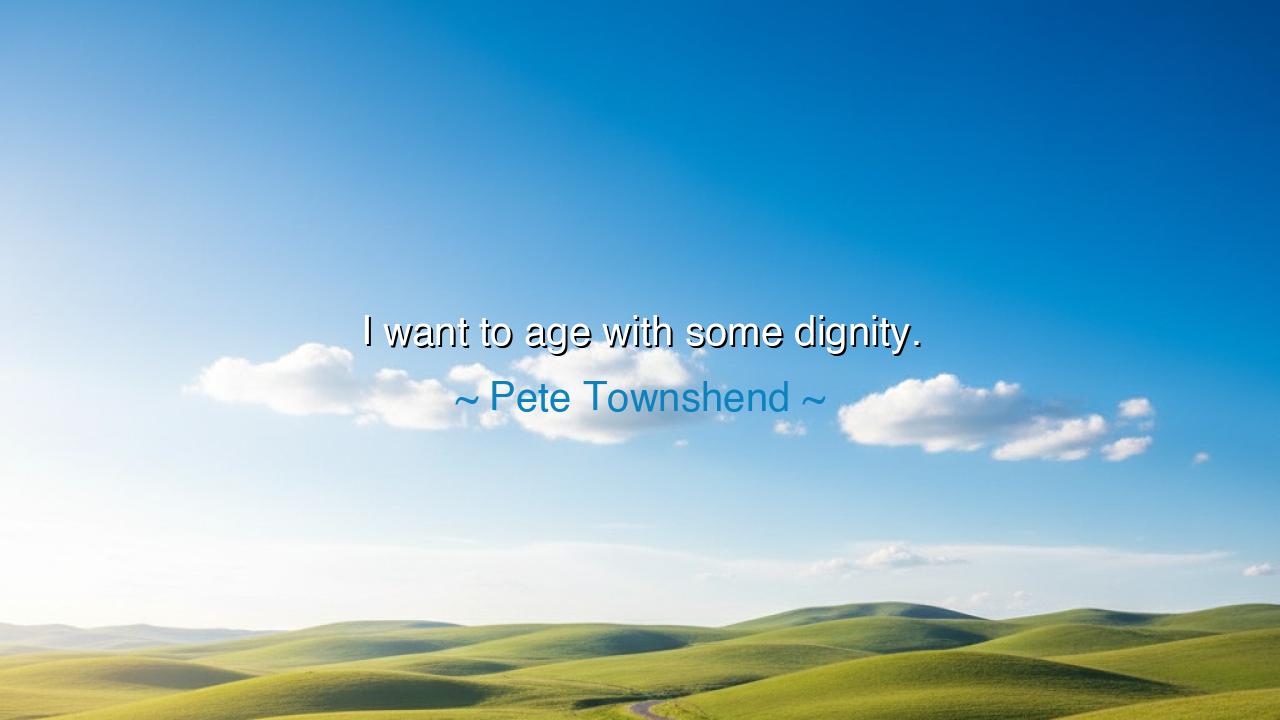
I want to age with some dignity.






When Pete Townshend, the fierce and poetic guitarist of The Who, said, “I want to age with some dignity,” his words carried the weight of rebellion softened by reflection. They came not from a man who feared age, but from one who had lived recklessly through its opposite — who had tasted the fire of youth so completely that he came to understand the cost of clinging to it. In those few words lies the ancient struggle of every soul who has danced in the flames of vitality and now seeks the calm of wisdom: the yearning to age with dignity, to face time not as an enemy but as a stern, inevitable teacher.
For Townshend, who once smashed guitars on stage and sang of dying before getting old, the quote marks a turning of spirit. It is an admission that glory, noise, and chaos are not the only measures of life’s greatness. To age with dignity is to refuse both despair and denial — to neither hide from time nor mock it, but to walk with it, unashamed. It is to let the years carve their lines upon the face while keeping the light within the eyes. In the heart of these words lies the courage to evolve — to surrender the vanity of youth while preserving the fire of truth.
Throughout history, those who have aged with dignity have done so by mastering the art of acceptance without surrender. Consider Sophocles, who wrote his final tragedy, Oedipus at Colonus, when he was over ninety years old. He did not cling to the passions of youth; he transmuted them into insight. His work became quieter, deeper, more resonant — a song of reconciliation between man and fate. Or think of Leonard Cohen, who, in his later years, transformed his once-raw voice into a gravelly prayer. He no longer sought to burn brightly but to illuminate gently. Both men, like Townshend, teach us that dignity in age is not about holding onto youth, but about embodying truth — to live each season in harmony with its music.
But Townshend’s reflection also carries an unspoken sorrow — the sorrow of seeing those who could not bear to change. Many artists, warriors, and dreamers have fallen trying to remain forever young, mistaking youth for purpose and aging for decline. Yet time’s law is unbreakable. The body weakens, the passions alter, the world moves on. To resist it with vanity is to live in illusion; to meet it with grace is to attain freedom. Dignity, then, is not found in the denial of decay but in the beauty of transformation. It is the power to say, “I have changed, and yet I remain myself.”
To age with dignity is not to retreat from life, but to live it with intention. It is to choose substance over spectacle, wisdom over noise, integrity over pretense. It is to know when to speak and when to listen, when to strive and when to yield. Townshend’s words, though simple, reach toward this deeper philosophy — that there is nobility in restraint, and serenity in acceptance. The dignity he speaks of is not pride, but peace — the peace of one who has learned that time, though merciless, can also be merciful to those who honor it.
In this way, aging becomes a sacred art. To age well, one must cultivate humility, gratitude, and presence. The pleasures of youth are swift and fiery; those of age are slow and luminous. The young run to conquer the world; the old walk to understand it. Each wrinkle, each memory, is a testament to survival, to endurance, to love. The one who ages with dignity turns their life into a tapestry — woven not with the glitter of what was lost, but with the gold of what remains.
So, O listener, learn from this truth: do not fear age, but earn it. Let it find you honest, thoughtful, still curious about the world. Live so that when the mirror shows the face of time, you can smile at it without shame. Nurture your spirit as you once nurtured your strength; seek meaning where once you sought applause. For the greatest rebellion against age is not to fight it, but to transform it into wisdom.
Thus, the teaching endures: dignity is the final music of the soul. It is the song of those who have lived fiercely, loved deeply, and learned to bow to time without breaking. Like Pete Townshend, may we all come to that blessed moment — when the fire of youth no longer consumes, but warms; when the noise of the world fades, and what remains is not vanity, but grace.






AAdministratorAdministrator
Welcome, honored guests. Please leave a comment, we will respond soon